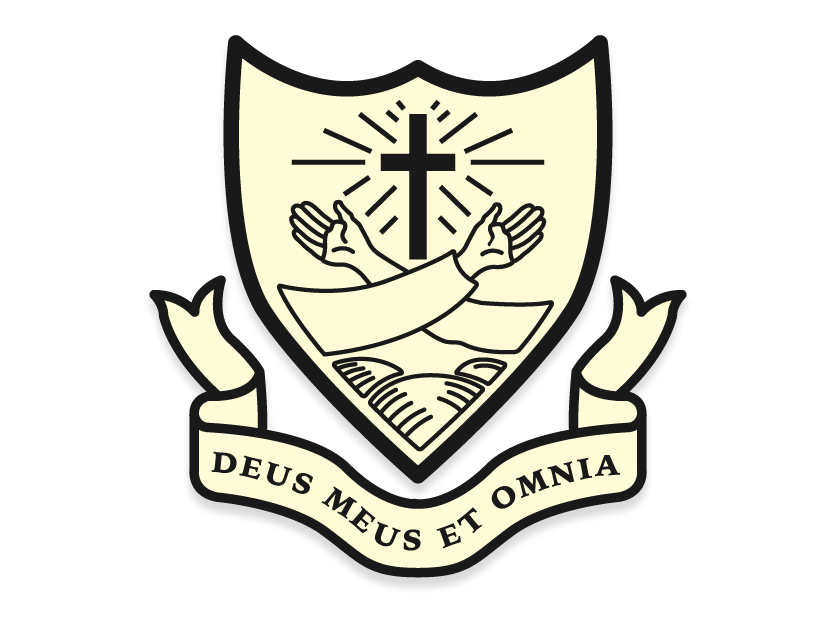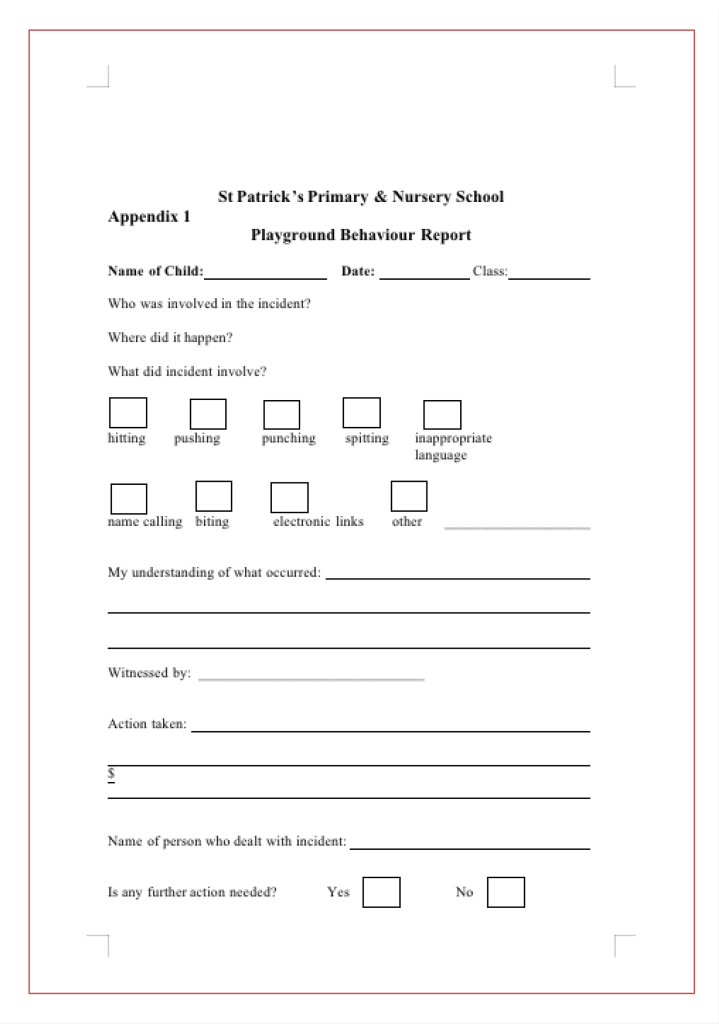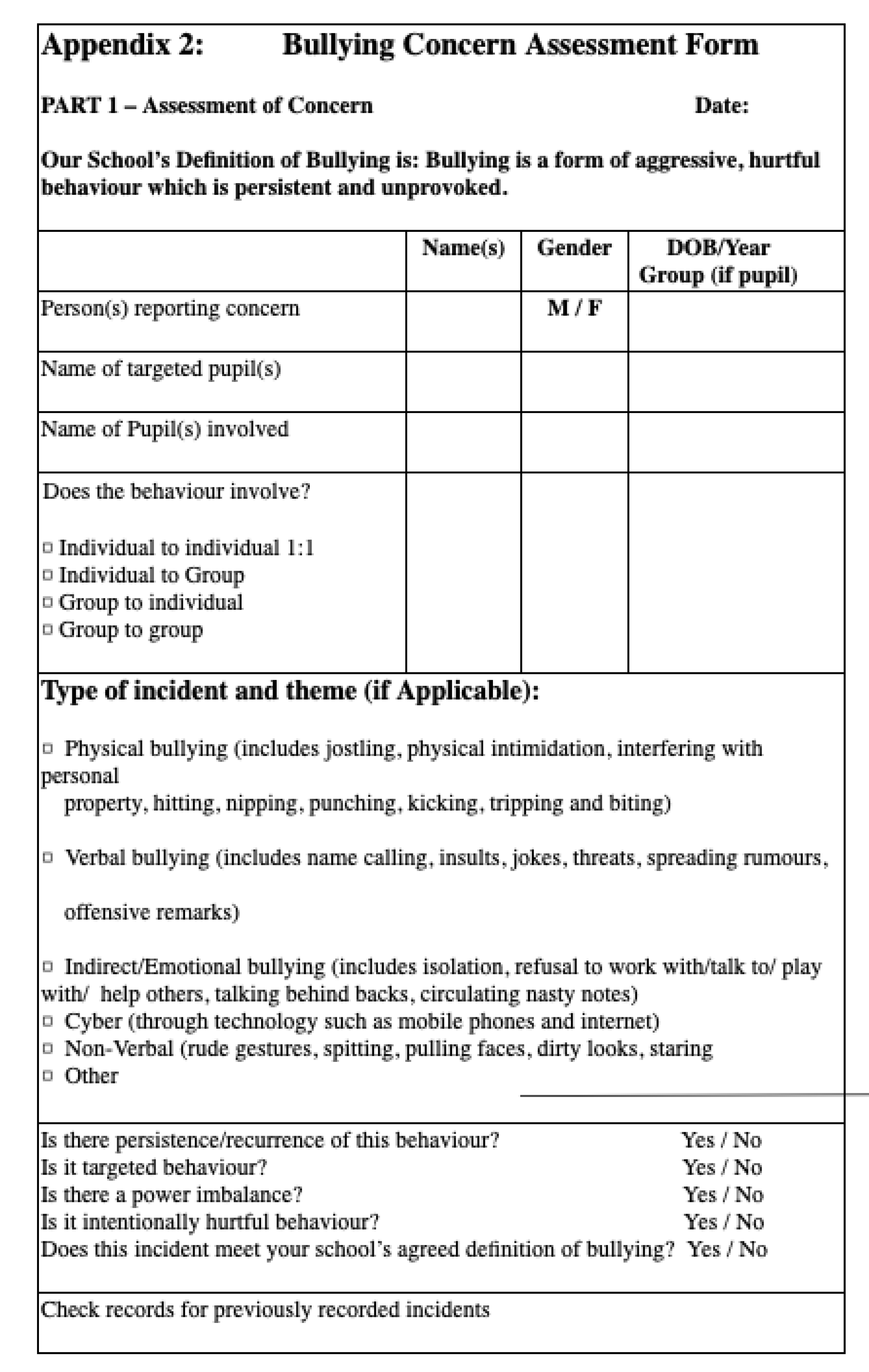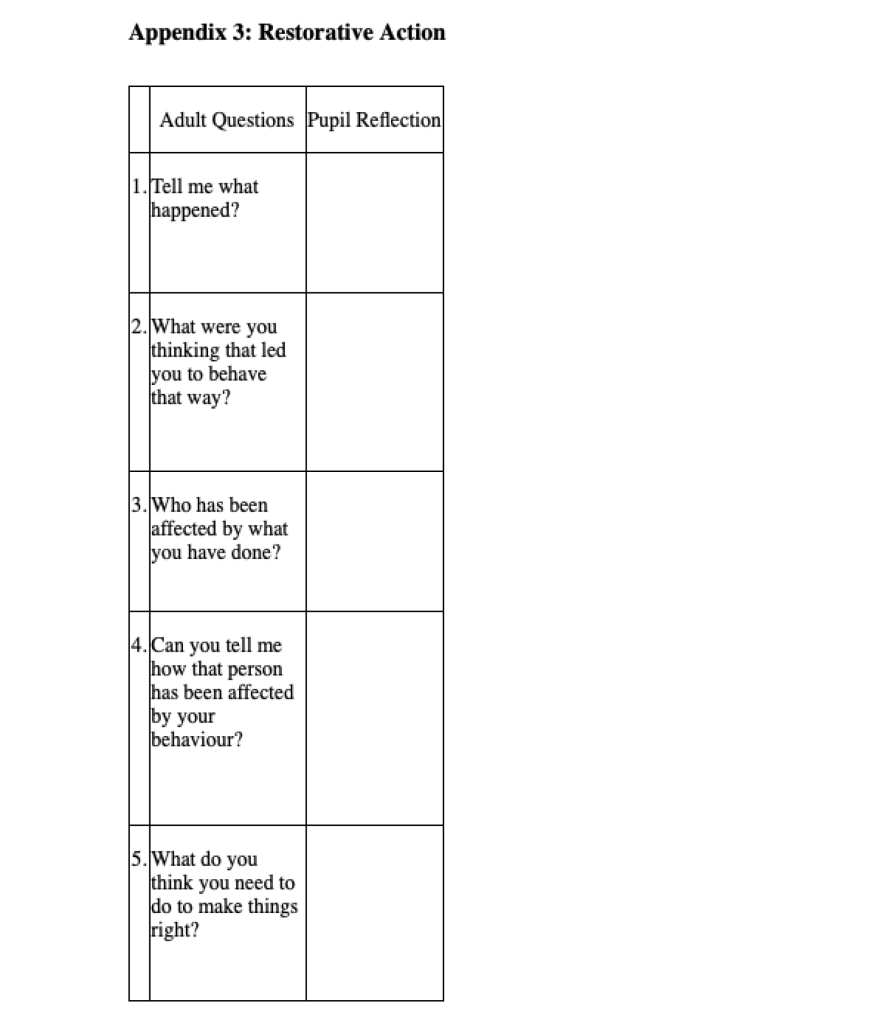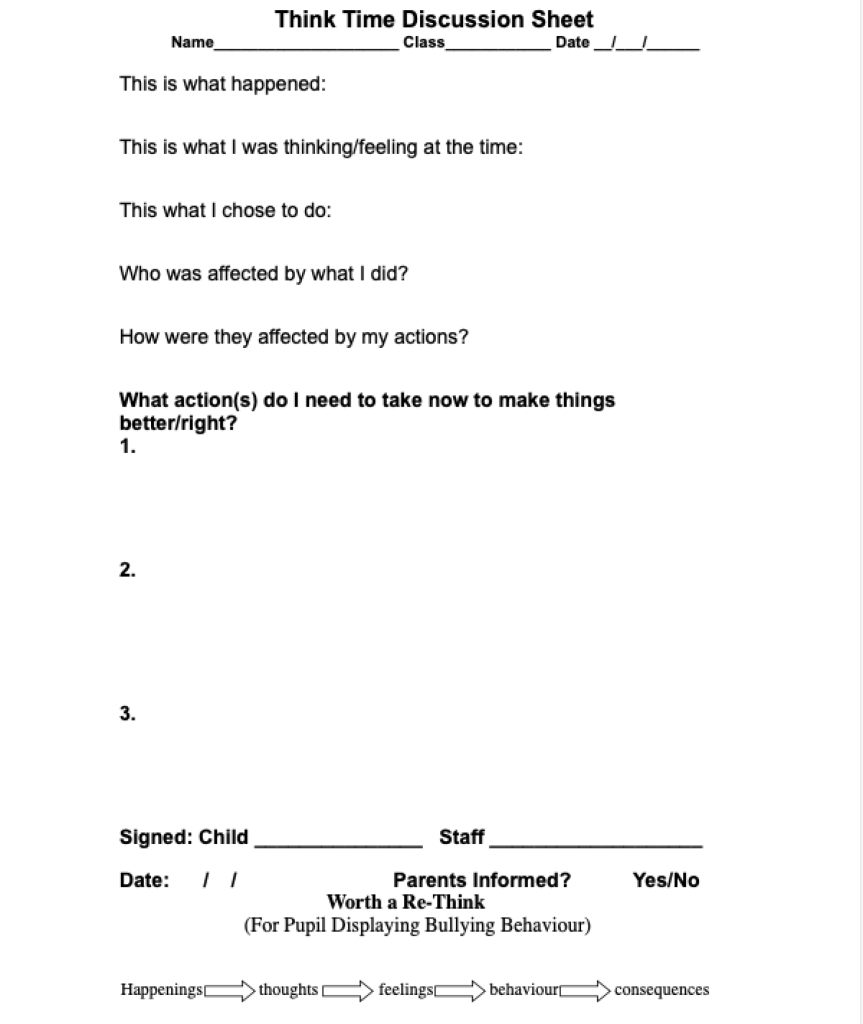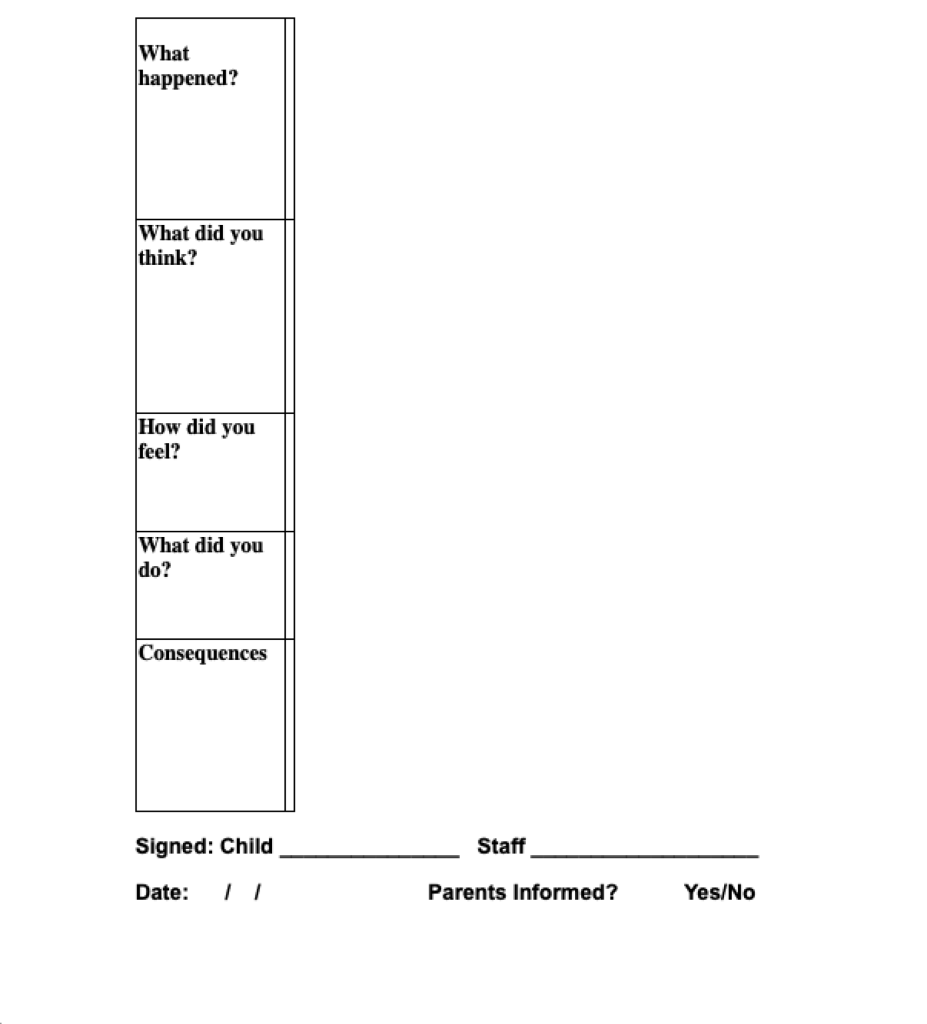
ANTI - BULLYING POLICY
Amended :January 2018
Updated : October 2020
Phone Number
(028) 3085 1294
Rationale
St. Patrick’s Primary & Nursery School is first and foremost a caring school where a strong and vibrant Catholic ethos permeates all aspects of school life and the service it provides for all within and beyond the school community.
It is steeped in the strong core values and traditions of the Sisters of St. Clare and as such nurtures in its children a tangible sense of being loved, belonging and self- worth.We believe that all members of our school community have the right to work and play within a secure and caring environment, regardless of age, gender, appearance, race, religion or social and cultural background. It is our responsibility to contribute to, maintain and enhance such an environment.
AIMS AND OBJECTIVES OF OUR ANTI-BULLYING POLICY
Our school is committed to the promotion of effective teaching and learning for all its children. Accordingly, all within our school community will continue to work to create an environment within which positive relationships will be fostered. The school seeks at all times to promote an Anti-Bullying culture which protects the children. Any form of Bullying behaviour will therefore not be tolerated and will be addressed promptly with RESOLUTION as the key focus for the way forward. Should bullying behaviour occur, the needs of all those involved will be paramount. The school will take all reasonable measures to ensure that the situation is resolved and will not reoccur.
As a school committed to Self /Mutual Respect and positive relationships at all levels we aim:
- To promote self- discipline and genuine, mutual respect among children
- To implement a robust approach to sustained good behaviour
- To promote a shared understanding of an acceptable standard of behaviour
- To protect our children by helping them to recognise unacceptable behaviour in others and develop resilience in
- acquiring the confidence and skills they need to keep themselves safe
- To strive to prevent any form of bullying behaviour
CONTEXT
This Policy takes account of the appropriate statutory requirements
- The Addressing Bullying in Schools Act (Northern Ireland) 2016
- The Education and Libraries Order (Northern Ireland) 2003 (A17-19)
- The Education (School Development Plans) Regulations (Northern Ireland) 2010
- The Children (Northern Ireland) Order 1995
- The Human Rights Act 1998
- The Health and Safety at Work Order (Northern Ireland) 1978
As a school committed to Self /Mutual Respect and positive relationships at all levels we aim:
- The Addressing Bullying in Schools Act (Northern Ireland) 2016 Statutory Guidance for Schools and Boards of Governors (DE, 2019)
- Pastoral Care in School: Promoting Positive Behaviour (DE, 2001)
- Safeguarding and Child Protection in Schools: A Guide for Schools (DE, 2017)
- Co-operating to Safeguard Children and Young People in Northern Ireland (Dept. of Health, Social Services and Public Safety, 2016)
Participation and Consultation Process
This Policy has been drawn up and agreed with all members of staff and governors in liaison with the School Council. In updating
the policy, we have engaged in the following consultation process:
– Awareness raising via Anti-Bullying Week 2019
– Seeking views of a sample of parents and governors
– Observations and Feedback from staff
– Seeking views of pupils via Principal’s group meetings and with School Council.
AGREED DEFINITION OF BULLYING BEHAVIOUR
The following definition of bullying has been agreed:
Bullying is deliberately hurtful behaviour which is repetitive, persistent and unprovoked. It causes distress, is intentionally harmful
and infringes on the rights and needs of another. It involves an imbalance of power, leaving a child feeling helpless to prevent or
stop it. Bullying can take various forms and may be perpetuated by individuals or by groups of children
The following definition of bullying has been agreed:
Physical: pushing, shoving, hitting, pinching, punching, elbowing, jostling, kicking, tripping, scratching and biting.
Emotional: some forms of exclusion, talking behind backs, circulating hurtful notes, covert or subtle intimidations.
Verbal: name calling, teasing, taunting offensive remarks, sarcastic comments, spreading rumours.
Non-Verbal: rude gestures, spitting, pulling faces, dirty looks, staring.
Cyber Bullying: Unwelcome text messages, picture/video clips, bullying via cameras/computers, phone calls, bullying via mobile phones or computers.
Bullying is not the same as separate, one-off incidents of unacceptable behaviour’ e.g. when a pupil loses their temper during a playground game and strikes out at another child.
When assessing a one-off incident, to make a decision on whether to classify it as bullying, the school shall consider the following criteria:
- severity and significance of the incident
- evidence of pre-meditation
- impact of the incident on individuals (physical/emotional)
- impact of the incidents on wider school community
- previous relationships between those involved
- any previous incidents involving the individuals
Unacceptable, rough behaviour which leads to another pupil being hurt is not tolerated in St Patrick’s and the children involved will be given support and encouragement to resolve their behaviour and restore their relationship. When behaviour of this nature occurs it will be addressed within the terms of the school’s Positive Behaviour Policy and a ‘Playground Report Form’ (See Appendix 1) will be completed and noted in the teacher’s Blue Book. This behaviour will be monitored appropriately as it may require further intervention.
Responsibilities of all staff
Our staff will:
- Be familiar with the ‘Effective Responses to Bullying Behaviour’ document (NIABF) and follow guidance therein appropriately
- Address issues firmly, fairly and promptly
- Commit to a solution based approach
- Foster in our children self-esteem, self-respect and respect for others.
- Demonstrate by personal and professional example, high standards of personal and social behaviour.
- Ensure the delivery of a robust Anti Bullying curriculum at an age appropriate level e.g., PDMU activities, Grow in Love, Circle Time, etc.
- Emphasise the importance of telling an adult about any situation which could be perceived as bullying when it happens.
- Be constantly vigilant and alert to signs of potential bullying behaviour.
- Encourage children to take responsibility for their actions, reflect on any inappropriate behaviour and move towards resolution.
- Listen carefully to children who have experienced perceived bullying behaviour, take what they say seriously and act promptly to support and protect them.
- Listen to and act appropriately on any concern raised by a parent/carer.
- Report and record suspected cases of bullying to the designated teacher Mrs Mc Kinley or Mrs Ryan. Use the Bullying Concern Assessment Form (BCAF) appropriately (see Appendix 2)
- Inform other staff on a ‘need to know’ basis e.g. Teaching/Supervisory Assistant etc.
- Follow up any concern raised by a parent/other about alleged bullying behaviour i.e. agreed action/Risk Assessment.
- Follow school’s agreed procedures in dealing with Bullying behaviours.
- Implement, monitor and review agreed action.
- Report back promptly to those involved on the action taken and the effectiveness regarding resolution.
- Record adult action and developments chronologically (Class Teacher in liaison with Mrs Mc Kinley and Mrs Ryan). Mrs Ryan will maintain and update the BCAF appropriately regarding issues.
Responsibilities of all staff
We expect our children to :
- Endeavour to treat peers with respect at all times.
- Refrain from becoming involved in any kind of inappropriate/potentially bullying behaviour.
- Intervene to protect a child who is perceived as experiencing bullying behaviour, unless it is unsafe to do so.
- Report to a member of staff any witnessed or suspected instances of bullying behaviour, to dispel any climate of secrecy and help to prevent any further instances.
- Cooperate with adults in a truthful manner when working towards resolution.
- Build relationships and move forward in a spirit of mutual support.
Anyone who becomes the target of bullying behaviour or is aware of potential bullying behaviour involving their peers is encouraged to speak out in an effort to resolve the situation or prevent it escalating.
Responsibilities of Parents
Parents should support their children and the school by:
- Being mindful of any signs of distress or unusual behaviour which might be an indication of potentially bullying behaviour.
- Encouraging their children to report any potentially bullying behaviour promptly to their class teacher/Mrs Ryan/Mrs McKinley in order to have the matter addressed.
- Assuring their child that appropriate action will be taken.
- Informing the school of any suspected bullying behaviour, even if their children are not involved. Attempt to ascertain the facts of the situation.
- Cooperating with the school, if their child is experiencing or displaying bullying behaviour.
- Understand that the term ‘Bullying’ can and is often used loosely and can be based solely on a child’s perception of events.
- Accepting that the school will seek always to establish an accurate account of events when determining whether or not an incident of Bullying has occurred.
Preventative Measures:
We believe that the robust implementation of preventative measures will greatly assist in reducing the incidence of potentially bullying behaviour. We will take the following proactive steps.
1. Ethos and Pastoral Care:
Through the daily living out of our Pastoral Care Policy, we promote the dignity and wellbeing of everyone in the school community. We seek always to be a ‘Listening School’ We encourage the children to express their feelings, fears and concerns in a comfortable atmosphere e.g. Grow in Love and PDMU programmes. Our School Council is guided proactively to take account of and act upon the children’s views and opinions. The Annual School Forum is a particularly effective mechanism in working collectively for the good of everyone in our school community. We promote and reward good behaviour and acts of kindness e.g. at class level/weekly assemblies, Prayer Services, Awards Ceremonies, Golden Time, etc. Positive classroom and playground strategies are used meaningfully to encourage the attributes of caring, friendliness and courtesy in all aspects of school life.
2. Break and Lunchtime Play
Our positive behaviour initiative identifies the need for children to interact with each other at playtime through games and activities. Children learn to share their play space. Older children are encouraged to learn new games – younger children avail of activities/toys in marked playground areas. Thus the opportunity for bullying behaviour to take place is reduced.
We support our Teaching Assistants and Lunchtime Supervisors in the promotion of positive play and strategies for dealing with incidents of inappropriate behaviour/ potential bullying. Children in P.7 act as playground buddies and are given roles of responsibility to help prevent inappropriate behaviour/potential bullying occurring. We encourage the children to be creative and imaginative in devising play experiences i.e. ‘make their own fun’. Furthermore, we provide a wide range of play equipment appropriately to ensure that they are happily engaged in enjoyable playtime activities.
Lunchtime Supervisors have received training in the promotion of positive play.
They are in a position of authority at playtime and take the lead in dealing with incidents of unacceptable behaviour.
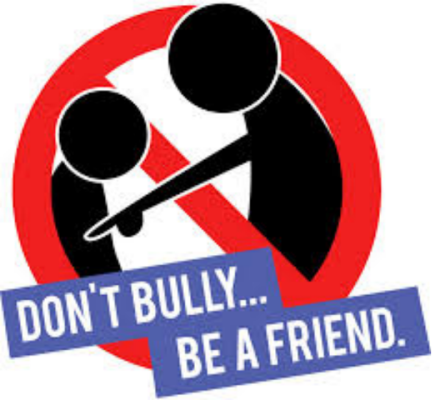
3.Curriculum
The key curriculum area of PDMU (Personal Development and Mutual Understanding) is designated to the promotion of positive behaviour and personal safety. Children learn to recognise and understand a variety of feelings and emotions and the need to manage them in a safe and positive way.
The children are given opportunities to interact with their peers and other class groupings and to use a range of strategies to manage conflict if it arises. Our PDMU programme is further supported by other curriculum areas:
-Grow in Love Programme
– Circle Time
– P7 Transition Programme, which highlights resilience as a key life strategy
– Drama workshops.
– Play based Learning/Activity Based Learning
– The TELL campaign is constantly promoted as a key strategy in helping a child deal with inappropriate behaviour/potential bullying
– Literacy activities (Novels, poetry and plays with bullying themes)
4.Whole School approaches
– Displays of the children’s work are used effectively both at class and whole school level as reminders for the need for good behaviour and contain strategies for dealing with perceived bullying behaviour.
– Anti-Bullying messages are placed strategically throughout the school environment as reminders of good practice for the children.
– The weekly assembly is used to present information to the children and aspects of acceptable/unacceptable behaviour are often discussed. The principal meets with the various year groups to discuss matters which affect them and listens carefully to suggestions. These suggestions are considered and actioned appropriately.
– The school App and Facebook page are used to reinforce key messages within the area of Anti-Bullying.
– The area of Positive Behaviour and Anti Bullying is an agenda item at the annual Parents’ Information Evenings in September annually. Follow up is provided where deemed appropriate.
– Outside agencies provide workshop support at an age appropriate level e.g. PSNI, Replay Theatre, Relax Kids, EWO Service, Helping Hands, Sunflower Programme, Wayne’s Top Tips, etc.
Lunchtime Supervisors have received training in the promotion of positive play.
5.Anti-Bullying Week
The school participates in the N. Ireland Anti-Bullying Forum’s Anti-Bullying Week programme in late November annually. As a school community we focus on the area of Bullying and use specific resources and activities to equip the children with the requisite skills to deal with any potential bullying situation. This is followed up on an ongoing basis appropriately over the school year.
Procedures for Dealing with Incidences of Potential Bullying Behaviour
When responding to a potential Bullying concern, staff will primarily adopt a positive mindset and when subsequently managing a Bullying situation, every effort will be made to be CALM, POSITIVE, ASSERTIVE AND CONFIDENT in determining the appropriate level of response as they move towards RESOLUTION.
1. Reporting of an incident:
When a perceived bullying incident is reported, the information will be passed on to the following personnel:
– The teacher of any child involved
– The Principal/Vice-Principal/Senior Teacher
– The Designated Teacher for Safeguarding & Child Protection (as appropriate)
– Where necessary, the parents of the children involved
2. Investigation of an incident:
– This will normally be carried out by the class teacher in conjunction with the Principal/Vice Principal – using a Restorative approach (see Appendix 3: Restorative Questioning)
– To determine the level of severity, staff will take account of the nature, frequency and duration of the Bullying behaviour and the perceptions of the child allegedly being bullied.
– A record will be made using the Teacher’s Blue Book/BACF/Safeguarding & CP Record as appropriate and retained in school records.
3. Agreement on a plan for resolution:
– As a way forward, a plan will be devised to resolve the conflict. Key personnel will be involved appropriately i.e. Principal, Vice Principal, Class Teacher, Designated Teacher, Safeguarding Team, SENCO – this plan will be shared with parents and the children concerned as deemed appropriate.
– The plan will include targets for acceptable behaviour and will set out
support measures which will be provided for the pupils concerned. We will adopt a caring and listening approach for the children concerned i.e. those presenting as the target of Bullying behaviour and those who present as displaying Bullying behaviour. We will be mindful that children displaying Bullying behaviour may be vulnerable i.e. having particular individual needs.
4. Interventions:
When responding to a bullying concern, school staff will implement interventions aimed at responding to the behaviour, resolving the concern and restoring the wellbeing of those involved. Where appropriate, school staff may implement sanctions for those displaying bullying behaviour.
– Restorative action will use the Intervention levels structure, as outlined in the ‘Effective Responses to Bullying’ document i.e. Low to High Risk categories e.g. Peer/Adult support, Coping Skills, Strength Building Plan, Support Group, etc.
– Regular monitoring and review of situation by the class teacher/key staff member will take place
– Referral to relevant outside agencies i.e. educational/medical support
Referral to relevant investigative agencies e.g. Gateway Team, PSNI
– Where/when it is deemed appropriate or in complex situations, parents will be involved immediately.
5. Further Action
– Where necessary, the school will draw on support from a range of outside agencies including Education Welfare Officer, Behaviour Management Team Educational Psychology Service, HSCT, Gateway Team.
– In extreme cases, the bullying behaviour will be brought to the attention of the school’s Board of Governors.
– Parents of all children involved will be informed of the school’s action and will be involved of any subsequent action.
Links with other school policies
This Anti-Bullying policy forms part of the school’s overall Pastoral Care Policies.
It links with our Safeguarding & Child Protection Policy which strives to protect children from harm and develop their personal safety strategies.
It links with the Positive Behaviour Policy in which the school promotes high standards of behaviour, details the standards of behaviour which are considered inappropriate and the restorative approach implemented in rebuilding harmonious relationships.
It links with our Special Educational Needs Policy which outlines the school’s practice in facilitating the particular needs of individual children, including behavioural issues.
It links with our E-Safety Policy in which the school outlines the steps taken to ensure children’s safety when utilising ICT.
It links with our PDMU Policy as a learning area of the school curriculum which promotes the welfare of the children in our care
Professional Development of Staff
The school recognises the need for appropriate and adequate training for staff, i.e. teaching and non-teaching. This will include:
a commitment to ensuring that staff are regularly provided with appropriate opportunities for professional development
noting the impact of the training on both the policy and its procedures – e.g. any amendments made, inclusions added etc. and disseminating to staff
ensuring that opportunities for safeguarding training are afforded to Governors and all staff – teaching and non-teaching
ensuring awareness of the importance of a robust system of record keeping
Conclusion
Implementation of this policy will be monitored by the Principal, Senior Leadership Team and PDMU Co-ordinator where appropriate in consultation with staff, parents and children.
A report on recorded incidents of bullying behaviour will be presented to the Board of Governors as appropriate. Trends and priorities for action will be identified. Furthermore, Governors will assess the effectiveness of strategies aimed at preventing and responding to Bullying behaviour.
Feedback from ongoing monitoring will inform amendments and new ideas and strategies will be incorporated accordingly. This policy will be formally evaluated and reviewed, in consultation with children and their parents/carers, on or before October 2024.
Signed: (October 2020)
M Ryan (Principal)
N. lynchehaun (Chairperson of Governors)
